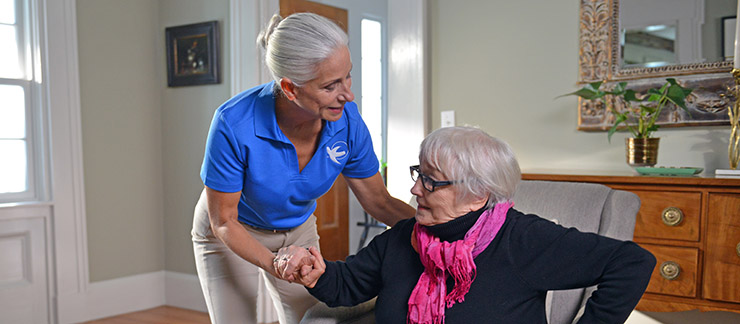
How Home Care Can Help Senior Women With Hernias
Many older women experience hernias as they age, unfortunately, due to body tissues getting weaker over time. Past pregnancies, hormone changes, previous abdominal surgery, and chronic obesity can also make hernias more likely.
Thankfully, most hernias are not life-threatening but can cause symptoms such as pain and digestive problems that interfere with daily activities. While doctors often recommend surgery to fix hernias, some senior women may be unable to have a procedure right away due to other health issues that make surgery risky.
As seniors manage their hernias at home, professional caregivers from Visiting Angels can help them follow their care plan and assist with daily tasks, including meal preparation, dressing and bathing, and light housekeeping. The goal is to help senior women maintain their comfort, independence, and quality of life while managing hernia symptoms.
Care Tips for Hernia Management at Home
Understanding how a hernia affects women as they age can help you offer effective support for a senior loved one at home.
Below are some general facts about abdominal hernias and lifestyle tips:
Lifting or Exercising
Senior women with hernias may feel pain when they try to do common activities that put pressure on the pelvic floor, such as:
- Bending
- Getting in or out of bed or a car
- Coughing
- Laughing
- Lifting heavy objects
- Prolonged sitting or standing
Your loved one’s doctor may provide specific activity restrictions and guidelines. Talk with the doctor about whether these at-home tips can help your loved one avoid or manage hernia-related discomfort at home:
- Avoid lifting heavy objects
- Maintain a healthy weight
- Use an ice pack to help reduce pain and inflammation
- Hug a pillow when coughing
- With a doctor’s guidance, give over-the-counter pain medication
A Visiting Angels personal caregiver can help with daily living activities, including bathing, dressing, and toileting, to safeguard your loved one’s independence at home.
Diet Changes
Your senior’s doctor may recommend avoiding foods that can cause inflammation or gas and bloating, which increases pressure in the abdomen. Some of these include:
- Acidic fruits and vegetables, such as tomatoes or citrus
- Alcohol
- Caffeinated drinks
- Dairy products
- Fried or processed foods
- High-fiber foods such as beans
Eating smaller meals may help prevent constipation, heartburn, and indigestion. A Visiting Angels professional caregiver can assist with meal planning, grocery shopping, and meal preparation.
Staying Social
It’s natural for your loved one to feel more stressed and anxious, especially when they’re worried about possible hernia complications. They may seem sad or moody due to chronic pain or lifestyle adjustments. Discomfort or self-consciousness can make some women with hernias step back from social activities, leading to loneliness.
Here are a few suggestions to help your senior deal with the emotional impacts of a hernia:
- Listen attentively to her concerns
- Provide reassurance without judgment
- Suggest healthy coping skills, such as meditation or time in nature
- If they don’t want to go out, encourage them to invite a friend for lunch or a game night
Companion care from Visiting Angels can help reduce isolation. Our caregivers offer friendly smiles, listening ears, and a friend to enjoy conversations and hobbies.
Keep Your Loved One Comfortable at Home
Living with a hernia can make simple tasks more challenging for seniors and their family caregivers. Talk with your loved one’s doctor regularly about ways to help your loved one stay safe and healthy at home.
Remember, you do not have to handle all these changes on your own. A Visiting Angels professional in-home caregiver can provide you with space to manage your own responsibilities while helping your loved one stay independent at home.
Contact your local home care office today to get started.



